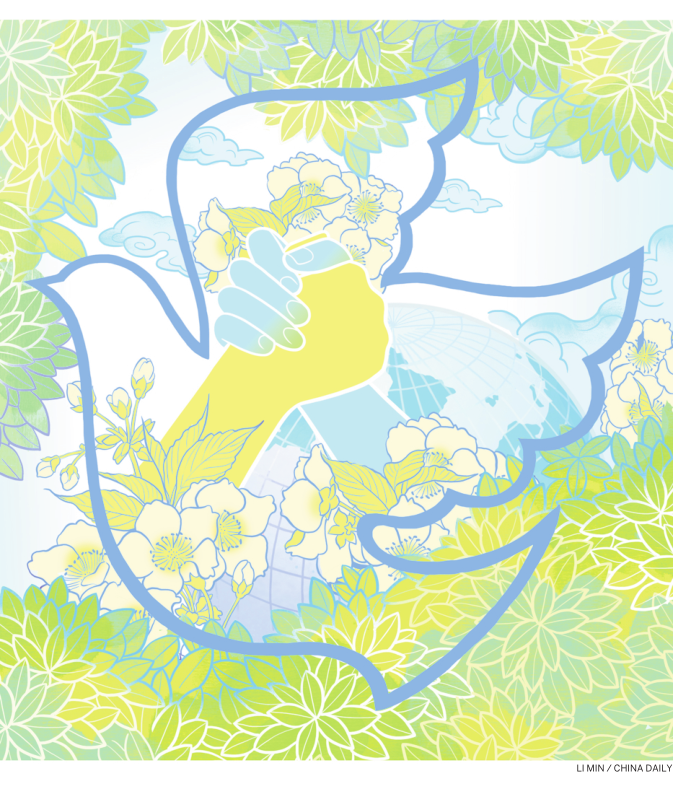Cataclysms transcend ideological barriers
By ONG TEE KEAT | China Daily Global | Updated: 2020-09-09 07:54

Will it take another global calamity for the US to understand that humankind as a whole has a shared future?
Any call for international cooperation amid the novel coronavirus pandemic, and several potential existential threats ranging from natural calamities to food security, should be welcome. Yet, due to the trust deficit, China's clarion call has fallen on the deaf ears of politicians' driven by a hegemonic agenda under the garb of propagating "democracy" worldwide, or simply obsessed with domestic agenda that warrants their political expediencies.
Over the ages, the world has been heterogeneous and pluralistic. Diverse civilizations, ethnic groups, faiths, and models of governance make up the world. And although disparities may breed competition or even rivalry, humankind has managed to contain, if not to eliminate, the risk of rivalry being conflict.
Learning from the bitter experiences of the two world wars, the international community built rules-based multilateral institutions to manage such risks, as well as to provide a platform for global collaboration in order to address common concerns and regional and global emergencies, some of which could threaten our very existence.
The peace dividends reaped by the international community over the past seven decades are attributable, to a large extent, to the wisdom of the post-World War II political leaders in running such rules-based institutions, albeit they are not without flaws. The United States, thanks to its military, economic and technological power, played the leading role in establishing and developing these institutions. But by somewhat grudgingly accepting the US' dominance, the global community did not give carte blanche to Washington to trample other countries' rights and interests.
The values of meritocracy and a level-playing field espoused by the West have to be respected non-selectively irrespective of ideologies, political systems and model of governance - because the current world order does not warrant a homogeneous model of global governance characterized by Western-style democracy. After all, the ultimate say in determining a country's model of governance lies in the hands of its people, not in the whims and fancies of any major power. And all overt and covert efforts a country makes to undermine another country's ideology, values, political system or model of governance is a blatant breach of the world order.
The pandemic has thrown global collaboration into disarray, with the US for the first time rejecting the mantle of the global leader in the fight against the pandemic.
While Washington continues to be obsessed with rhetoric of nativism going into the presidential election, the sad statistics of the US, which accounts for the highest numbers of COVID-19 infections and deaths, are simply too big a proverbial elephant to ignore.
While, China, despite battling the pandemic at home in the early stage of the pandemic, dispatched medicines, medical equipment and teams of health workers to many countries to help them fight the virus. Unfortunately, this laudable move, consistent with China's pursuit of building a community with a shared future for mankind, has been demonized as a "Trojan horse "aimed at exporting China's political system and governance model to other countries. In all fairness, no humanitarian aid of such nature deserves such severe yet unsubstantiated allegations from a country with which China has 40 years of diplomatic relations.
In recent months, anti-China stories from the West have inundated the mainstream international media. And Washington and its allies have been running their propaganda mills overtime, while regularly firing salvos at China, reminding one of the Cold War days.
It is not difficult to trace the xenophobic prejudice against the rise of China: a non-Anglophone member of the international community with political system and development philosophy different from that of the West. The West's anxiety over a rising China seems to have taken precedence over its concerns over the pandemic and the consequential economic downturn.
In the face of this public health crisis, those in the corridors of power aided by their team of spin doctors are visibly obsessed with the ideological differences between the West and China, while the urgency to deepen global cooperation in the fight against the pandemic has taken a back seat. And as these spin doctors relentlessly roll out misinformation, human lives continue to be lost.
The US has now upped the ante by trying desperately to trigger Cold War 2.0 against China, especially the Communist Party of China.
The spin doctors may succeed, to some extent, in weaving a negative narrative about China among the US public. But the call to launch a global ideological crusade against China in the name of safeguarding democracy cannot hide the superpower's real intention of stymieing China's peaceful rise - because the US administration fears Beijing is poised to supplant Washington as the global leader.
In the US, many believe China, thanks to its growing global significance and influence, is capable of erasing even the last vestiges of Pax Americana despite repeated denial of such intention and readiness by China.
Beijing's restraint in averting a head-on collision with Washington has unfortunately gone unheeded - as a result, Washington has not stopped playing its zero-sum games.
The lofty ideal of jointly building a community with a shared future for mankind will remain a somewhat distant dream so long as Washington continues to dominate the present model of global governance. Perhaps it would take another global calamity to dawn upon the recalcitrant US decision-makers the simple logic that humankind as a whole has a shared future. After all, cataclysms transcend ideological barriers.
The author is a former deputy speaker of the Malaysian Parliament, and former federal transport minister and president of the Inclusive Renaissance Foundation, Malaysia.























